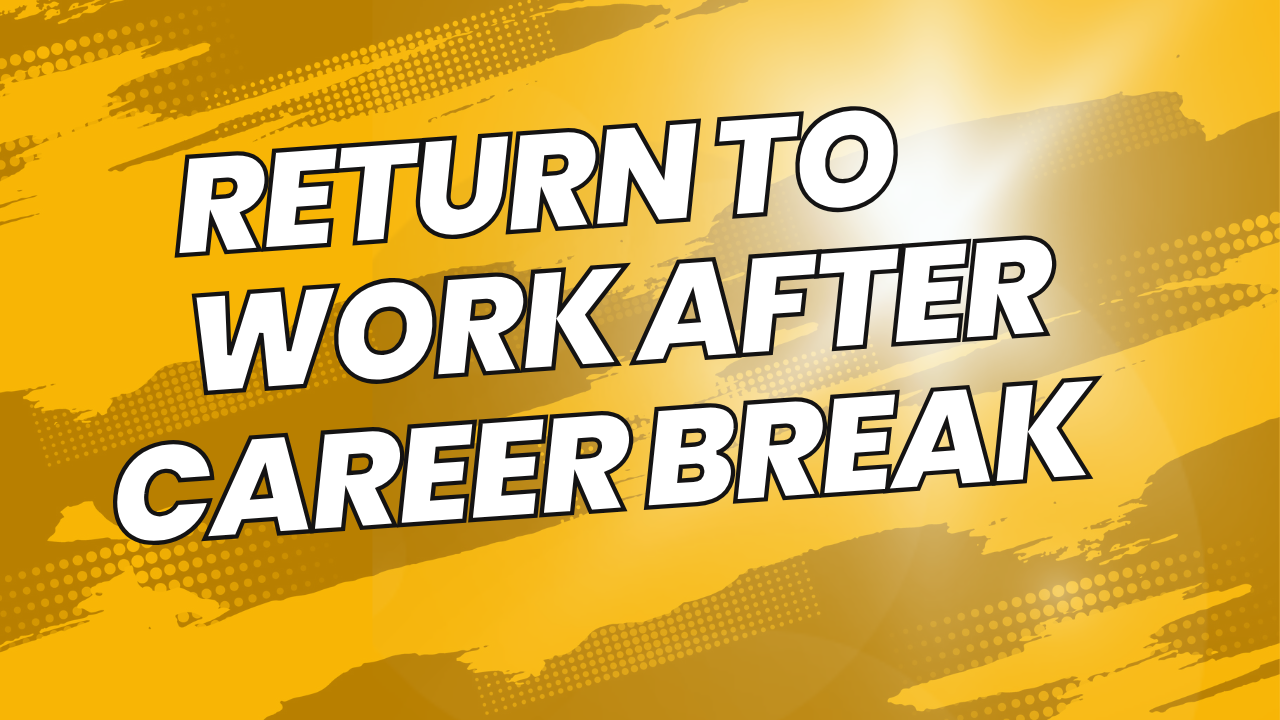Table of Contents
Taking a career break is a significant decision, whether it’s to focus on family, personal growth, health, or education. However, reentering the workforce after time away can feel intimidating. Whether you’ve been out for a few months or several years, the process of returning to work requires preparation, confidence, and a clear strategy.
This article provides actionable tips and insights to help you successfully transition back into the workforce, showcasing your value to potential employers and making the most of your skills and experiences.
Assess Your Readiness
Before diving back into the job search, it’s crucial to evaluate your readiness to return to work. Ask yourself:
- What are my career goals now? Are you looking to return to the same field, or do you want to explore a new industry or role?
- What skills do I have? Reflect on the skills and experiences you gained before and during your break. You might have developed transferable skills such as organization, time management, or problem-solving.
- Am I mentally prepared? Returning to work can be a big adjustment. Ensure you’re ready to commit to the responsibilities of a job.
Once you’re clear on your goals and readiness, you’ll be better positioned to navigate the job market with confidence.
Update Your Skills
The workplace evolves quickly, and employers value candidates who stay current. Use your time before returning to work to refresh your knowledge and learn new skills. Here’s how:
- Take Online Courses: Platforms like Coursera, Udemy, and LinkedIn Learning offer courses in everything from project management to coding and digital marketing.
- Earn Certifications: A certification can validate your expertise in a specific area, such as data analytics, HR, or IT.
- Attend Workshops or Seminars: Look for local or virtual workshops where you can learn new skills and connect with industry professionals.
- Learn New Tools: Familiarize yourself with the latest software and tools used in your field, whether it’s project management tools like Asana or CRM platforms like Salesforce.
Keeping your skills up to date not only boosts your confidence but also shows potential employers that you’re proactive and adaptable.
Refresh Your Resume and LinkedIn Profile
Your resume and LinkedIn profile are your first impression on recruiters. Make sure they reflect your skills and achievements effectively.
For Your Resume
- Acknowledge the Gap: Don’t shy away from addressing your career break. Use a short statement in your summary or work history to explain the break briefly and positively. For example:
“Took a two-year career break to focus on personal development and family responsibilities. During this time, I honed organizational and communication skills through volunteering and freelance projects.” - Highlight Relevant Skills: Focus on skills that align with the roles you’re targeting, even if they were developed outside formal employment.
- Quantify Achievements: Wherever possible, include metrics to demonstrate your impact in previous roles. For example: “Increased sales by 20% over six months by implementing a customer retention strategy.”
For LinkedIn
- Update Your Profile Photo: A professional, friendly photo creates a positive first impression.
- Write a Compelling Headline: Use keywords related to your desired role, such as “Experienced Marketing Professional | Digital Marketing Specialist | Content Strategist.”
- Add a Career Break Section: LinkedIn now allows you to add a career break under the “Experience” section. Use this feature to explain your time off and the skills you developed.
Leverage Your Network
Your professional network can be a powerful resource when returning to work. Many job opportunities are never advertised publicly and are filled through referrals. Here’s how to tap into your network effectively:
- Reconnect with Former Colleagues: Reach out to past colleagues, managers, or mentors. Let them know you’re reentering the workforce and ask if they’re aware of any opportunities.
- Attend Networking Events: Join industry-specific events, meetups, or conferences to expand your network.
- Join Professional Groups: Participate in LinkedIn groups, alumni associations, or local professional organizations related to your field.
- Ask for Referrals: Don’t hesitate to ask trusted contacts for introductions or referrals to hiring managers.
Remember to be clear about your career goals when reaching out. The more specific you are, the easier it is for others to help you.
Consider a Returnship Program
Returnship programs are designed for professionals reentering the workforce after a break. These programs, offered by companies such as Deloitte, IBM, and Amazon, provide structured training, mentorship, and often lead to full-time employment.
A returnship can:
- Help you ease back into work in a supportive environment.
- Allow you to refresh your skills and gain hands-on experience.
- Expand your professional network.
Research companies in your industry to see if they offer returnship opportunities.
Be Honest About Your Career Break
During interviews, employers may ask about your career break. Honesty is the best approach, but frame your answer positively. Here are some tips:
- Focus on What You Learned: Emphasize any personal growth, volunteer work, or skill-building activities you engaged in during the break.
- Show Enthusiasm: Let employers know you’re excited and ready to contribute to their team.
- Keep It Brief: Avoid long explanations. A concise, confident answer is more effective.
For example:
“I took a career break to care for my family. During that time, I stayed current in my field by taking online courses and volunteering, and I’m now ready to bring my skills and experience back to the workforce.”
Start Small if Needed
If you’re struggling to land a full-time role, consider starting with smaller commitments:
- Freelancing: Platforms like Upwork or Fiverr can help you gain experience and rebuild your portfolio.
- Part-Time Jobs: A part-time role can help you ease back into work while maintaining a work-life balance.
- Volunteering: Volunteering in your field not only helps you gain experience but also demonstrates your commitment and initiative.
These opportunities can serve as stepping stones to full-time employment.
Stay Up to Date with Industry Trends
Employers value candidates who are knowledgeable about the latest industry trends. Stay informed by:
- Reading Industry Blogs and Publications: Subscribe to relevant blogs, newsletters, and magazines.
- Following Thought Leaders: Connect with industry experts on LinkedIn and follow them for insights.
- Listening to Podcasts: Podcasts are a convenient way to stay updated while commuting or exercising.
Staying current shows employers that you’re engaged and ready to hit the ground running.
Practice Your Interview Skills
Interviews can be nerve-wracking, especially after a career break. Prepare thoroughly to build your confidence:
- Research Common Questions: Practice answering questions like “Why did you take a career break?” and “What skills do you bring to this role?”
- Use the STAR Method: Structure your answers using the STAR method (Situation, Task, Action, Result) to provide clear and concise responses.
- Role-Play: Practice with a friend or mentor to get feedback on your responses.
The more prepared you are, the more confident you’ll feel during interviews.
Build Your Confidence
Returning to work can feel daunting, but confidence is key. Here’s how to boost your self-assurance:
- Acknowledge Your Achievements: Reflect on your past accomplishments and remind yourself of the value you bring.
- Seek Support: Join support groups or forums for professionals returning to work. Hearing others’ success stories can inspire and motivate you.
- Set Realistic Goals: Take one step at a time and celebrate small wins along the way.
Remember, many people successfully return to work after a career break, and you can too!
Be Patient and Persistent
Finding the right job takes time, especially after a career break. Don’t get discouraged if you face rejections or delays. Stay persistent and keep refining your approach.
Consider setting a routine for your job search, such as dedicating specific hours each day to applying for jobs, networking, and upskilling.
Our Recommendation
Returning to work after a career break is a journey that requires preparation, determination, and self-belief. By updating your skills, leveraging your network, and embracing opportunities like returnships, you can successfully transition back into the workforce. Remember, your career break doesn’t define you – your skills, experiences, and potential do.
With the right mindset and strategies, you can find a fulfilling role that aligns with your goals and sets the stage for your next career chapter.
Frequently Asked Questions
Before re-entering the workforce, consider taking online courses, attending workshops, or obtaining certifications related to your field. Platforms like LinkedIn Learning, Coursera, and Udemy offer a variety of resources to help you refresh and enhance your skills, making you more competitive in the job market.
When explaining a career break, be honest but focus on the positives. Highlight any skills you developed or volunteer work you engaged in during the break. Employers appreciate candidates who are transparent and show how they’ve used their time away productively.
Rebuilding confidence takes time, but you can start by setting small, achievable goals. Practice self-compassion and remind yourself of your past achievements. Joining professional groups, networking with colleagues, or seeking mentorship can also provide the support and encouragement you need to ease back into the workforce.
Start by setting clear boundaries between work and personal time. Communicate openly with your employer about your needs for flexibility, if necessary. Gradually ease into your routine and prioritize tasks to avoid feeling overwhelmed. Time management tools or techniques like the Pomodoro method can also help you stay focused and balanced.
Reconnecting with your professional network is key. Attend industry events, join LinkedIn groups, or reach out to former colleagues and mentors. Networking online and in-person will help you stay updated on industry trends and open doors to potential opportunities. Don’t hesitate to ask for informational interviews to learn more about the current job market and make new connections.

Shridhar is a passionate career coach and expert writer with a focus on professional growth, job search strategies, and personal development. With years of experience in the corporate world, Shridhar understands the challenges professionals face in advancing their careers.


